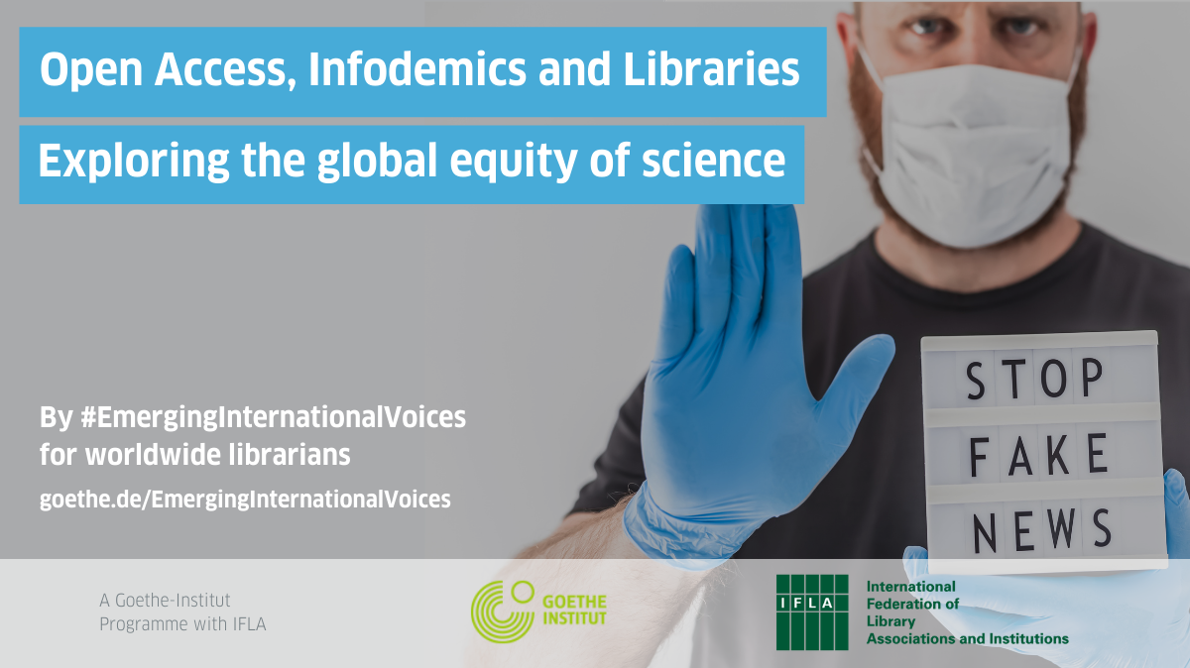Timely, sustainable, and more necessary than ever: Webinar on libraries, open access and infodemics
31 May 2021
The pandemic has underlined the importance of access to information for all, but at the same time, the risks of misinformation. Libraries have a huge potential to contribute, as highlighted in a webinar organised by participants in the IFLA-Goethe Institut Emerging International Voices Programme.
 Already in the early weeks of the pandemic, senior officials at the World Health Organization and elsewhere were talking about the risks of an infodemic.
Already in the early weeks of the pandemic, senior officials at the World Health Organization and elsewhere were talking about the risks of an infodemic.
Tackling this, they argued, needed to be a priority, in order to prevent misinformation from weakening the impact of policies and initiatives designed to slow or stop the spread of the pandemic.
A key part of the response to misinformation circulating is the provision of high-quality, easily accessible facts, based on research, something that the open access movement looks to ensure. However, open access publishing is not universal, and the simple availability of reliable information does not guarantee that it is used.
These are the challenges that participants in the Emerging International Voices webinar looked to address on 26 May. The Emerging International Voices programme is a joint initiative of the Goethe-Institut and IFLA, designed to support promising new professionals in the library field to build their experience and reach.
Introductory words came from IFLA Secretary-General Gerald Leitner, who underlined the need to provide positive solutions to cerns about infodemics, and Brigitte Döllgast, Head of the Library at the Goethe-Institut, who welcomed the ongoing engagement of the participants.
Following this, five speakers from around the world offered their perspectives.
Tina Purnat, WHO highlighted the scale and threat of the infodemic, and the need to act to counter its impact. She underlined the need for people to develop good information hygiene, alongside personal hygiene, in order to keep themselves and those around them safer, with libraries able to play a key role.
Victor Ejechi, StatiSense, Nigeria, urged participants to develop the right instincts when receiving information, and to be ready to check on other sources. Libraries were well placed to support this, but in turn required support and training to do so effectively.
Dr Feda Kulenovic, University of Sarajevo, Bosnia and Hercegovina, focused on the role of libraries in being proactive in getting information into the hands of users. They could be a sort of hactivist, shaping the policies and infrastructure that determine how information is produced, shared and accessed.
Professor Yasar Tonta, Haceteppe University, Turkey stressed how libraries can go beyond just checking facts on behalf of others to developing the skills in among users to be their own fact-checkers, ready to deal with new information. This provided, also, a more sustainable, long-term solution.
Finally, Dr Dasapta Erwin Irawan, Universiti Teknologi Bandung, Indonesia, emphasised that for open access to be truly universal, and so provide relevant opportunities and information for all, there needed to be a meeting point between different models of creation, sharing and assessment. Through this, we can support the drive to make more relevant information available for all.
A lively discussion at the end, drawing on questions from the audience, helped reinforce the importance of focusing on building individual skills, rather than trying to censor individual items of misinformation.
Participants nonetheless raised the question of what changes may be needed to the way in which information is shared, and in particular the risk of distortion by commercial interests. A more publicly-orientated information infrastructure could help re-promote freedoms.
Furthermore, panellists also highlighted the need for investment in this infrastructure – both libraries themselves and their staff, and the tools needed to promote open access for all.
Thanks go to the Emerging International Voices team who organised the webinar: Nilay Cevher, Damilare Oyedele, Madiareni Suleiman, Rita Aleixo, Ejla Curovac, and Naomi Smith, as well as to the Goethe-Institut.
You can view the webinar on YouTube. Find out more about the Emerging International Voices programme.